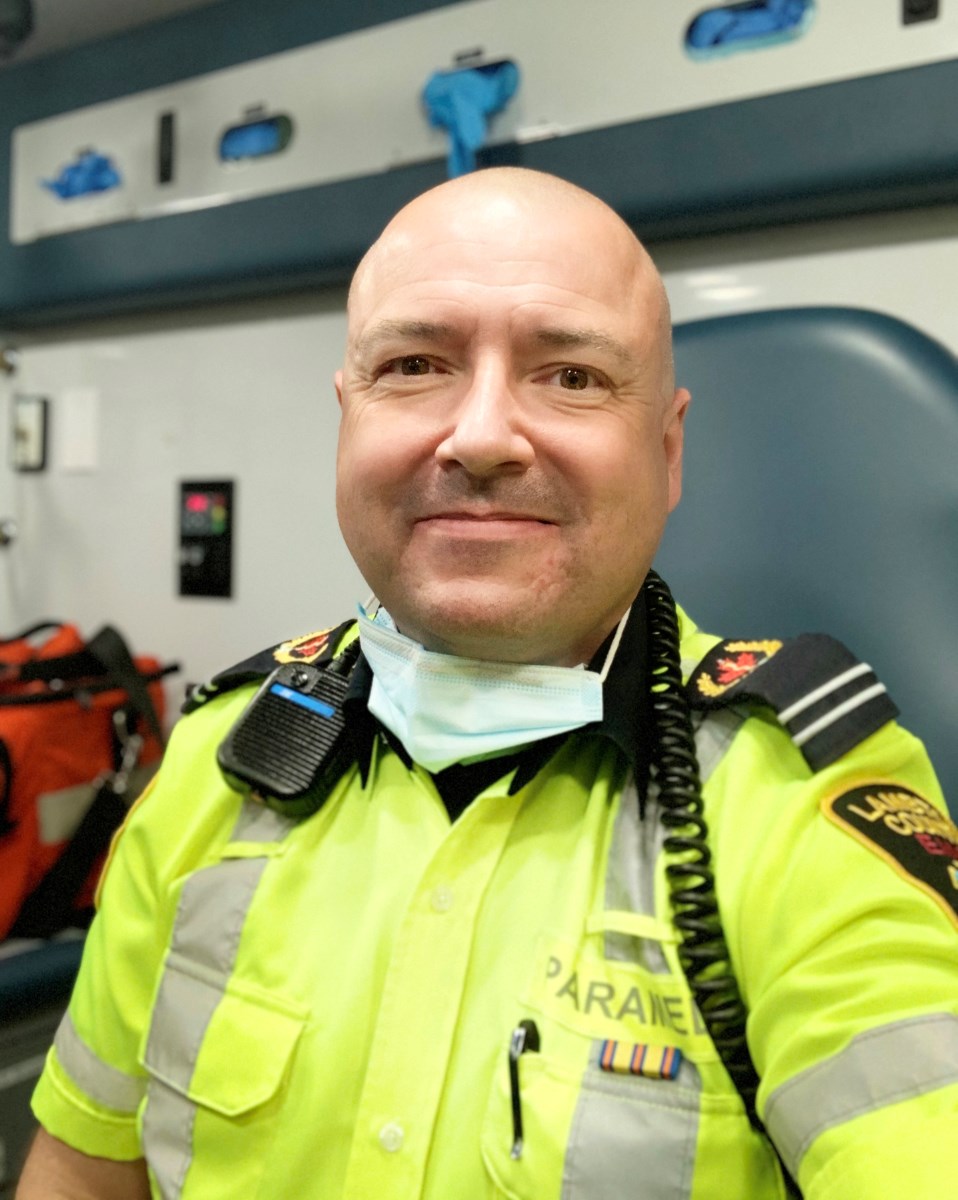Cathy Dobson
Blake Smith has worked 30 years as a paramedic with Lambton EMS (Emergency Medical Services). Through the pandemic he has worked with long-term care residents, transported COVID-19 patients from out-of-town, and vaccinated housebound residents as part of a mobile team with Lambton Public Health. This interview has been condensed.
JOURNAL – Hi Blake. Thanks for taking the time for this. What stands out for you on the job over the past year?
B.S. – So many things, so many stories. I spent hours at (a Sarnia retirement homes) doing COVID swabs during an outbreak. Many of those people were totally isolated and some had loved ones who had been taken away to ICU and the prognosis was not (good). I’d go in and swab them and they were lonely and scared, some just terrified of the unknown, and knowing they probably wouldn’t see their husband or wife again, that they might die alone.
So I’d go in to this job but end up being there as a grief counsellor almost. It happened multiple times and it hit me very hard. Something that would normally take five minutes, you’re there for half an hour. I didn’t want to just leave. I wanted to try to be compassionate and kind.
Whenever we talk about the pandemic, I always say we have to remember the ‘be kind’ aspect.
JOURNAL – Are there times you feel burned out?
B.S. – Yes. There were many sad moments, but I’m incredibly blessed to be married to a woman who understands so I always have someone to talk to and explain what’s going on. My sanity today is because of her.
JOURNAL – A lot of people are struggling with mental health issues now. How do you ensure you stay healthy?
B.S. – I’m a very upbeat, happy person and I make sure I get out, stay active, take our dogs walking. We’ve got a beautiful waterfront and we’re always down there as a family. There are times when I don’t want to, but I force myself to get going.
JOURNAL –You have been involved in the transfer of COVID patients from the GTA to Bluewater Health? Can you tell me about that?
B.S. – Yes, we got an email asking staff if we’d be interested in doing these kinds of transfers on our days off. I was able to help do two of these transfers out of Trillium Health in Mississauga.
JOURNAL – How do you prepare to transport a COVID patient in a confined space for such a lengthy trip?
B.S. – It’s no different from all calls where we’re suspicious of there being a COVID-type exposure. You’re wearing a gown, gloves of course, an N95-rated mask and protective eyewear. These people are also wearing masks so they are protecting us too.
There is also an exhaust fan in the ambulance, which does a pretty good job of refreshing the air. I’ve remained healthy with the PPE we’ve been using so I feel fairly safe.
JOURNAL – How do you ensure you don’t bring the virus home?
B.S. – You get home, you get changed, you get showered, your uniform is right into the washing machine. You get in, no touching, get clean and then you can start hanging out with your family. My wife is a healthcare worker too in the X-ray department at Bluewater Health. At first we were hyper-vigilant because we didn’t know about exposures. Having spent hours at outbreak places doing COVID swabs, you’re at a greater risk right away.
Now we’ve both had our second shots and our two girls (ages 15 and 19) are vaccinated so we’re feeling a bit more confident.
JOURNAL – I understand you’ve also been involved with the mobile vaccine units.
B.S. – Yes, with Lambton Public Health, predominantly doing the homebound vaccinations throughout May for people unable to leave their homes and make it to any of the vaccination clinics. They set up appointments with Public Health and we accompany one of the health nurses and give the vaccine, wait the 15 minutes and move on to the next person. I think there’s been about 100 throughout Lambton.
JOURNAL –And the mobile unit will go back for second doses?
B.S. – Yes, and I’m happy for every single one. The big discussion out there is about vaccine hesitation, so we’re happy people have done the research and decided this is something they want. We’re more than happy to help them if they are unable to get to one of the vaccination clinics.
JOURNAL – I appreciate your time and I thank you and your colleagues for everything you’ve done for our community this year.
B.S. - Thank you. I’ve been very proud of my colleagues and how they’ve dealt with this incredible obstacle. They’ve done incredibly well.
